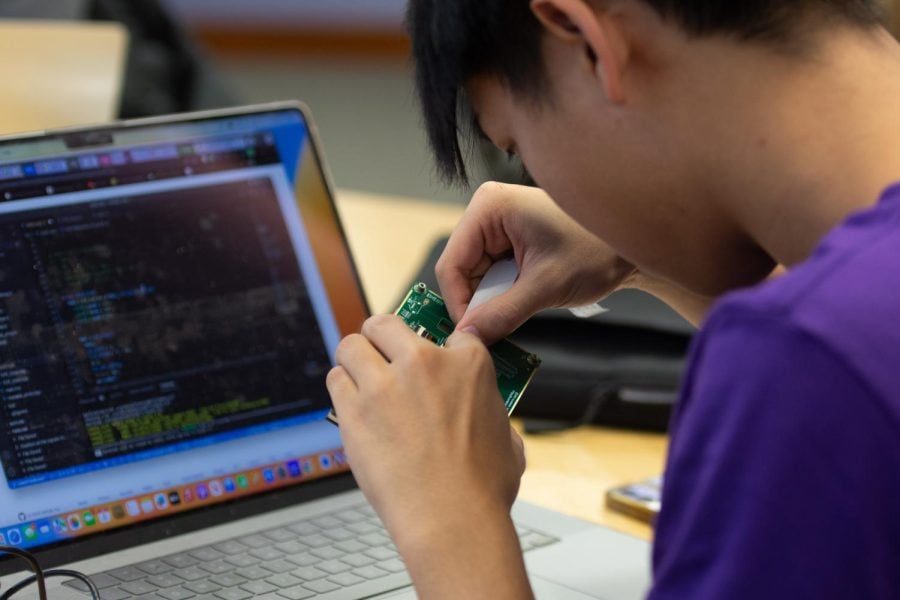NU Formula Racing revs up development on first electric car ahead of June competition
Beatrice Villaflor/The Daily Northwestern
McCormick freshman Kellen Lai programs electronics for the club’s fully electric car, NFR 23, as part of the software sub-team.
February 5, 2023
Northwestern Formula Racing is gearing up to compete with its first electric car, NFR 23, in the Society of Automotive Engineers International’s Formula SAE competition in June.
This is the first year the club will use a fully electric motor and battery pack, according to NU Formula Racing Project Manager and McCormick junior Sarah Yung.
Discussions on whether to adopt an electric motor and battery pack for the competition began at the end of the last school year following the turnover of NU Formula Racing’s executive board, according to Yung.
She said the organization switched to an electric car to align with sustainable engineering practices and better prepare its members for the industry.
“You can see the trend of electrification happening in industry all over the world,” Yung said. “Companies like Tesla and Lucid Motors, (among other) major car companies, are switching to electric.”
McCormick freshman Kellen Lai writes code for NU Formula Racing’s software sub-team, which constructs programs for the vehicle’s electronics such as display monitors.
Lai said his work at NU Formula Racing is often more similar to real-world manufacturing processes than the theoretical knowledge he gains from his courses.
“It’s just different (from) anything else I’ve done before,” Lai said. “Making something that’s not for a class … you can see something (come from) the code.”
Not all members of the group supported the switch to electric. Some members believed NU Formula Racing still had the chance to improve its combustion engines.
Yung attributed the discontent among some members to the decade-long history and prior knowledge the team has in creating combustion engines.
“Switching to electric (cars) means that we don’t have that base of resources to rely on, and that can be very scary,” Yung said.
She added that most first-year electric teams do not pass technical inspections, which means that electric teams can usually enter the competition for presentation and brand but cannot participate in the actual races.
Despite the risk of failure, McCormick senior Jacob Silacci, Chief Mechanical Engineer for NU Formula Racing, said there was commitment and passion behind the transition to electric.
“We don’t want to promote that mindset — to steer away from something just because you think you’re going to fail at it.” Silacci said.
Silacci said the group is currently manufacturing the car’s suspension systems and is aiming to conduct the first test drive in late February or early March.
Yung credited part of the club’s success to varied perspectives within the group. Four of the nine executive board members of Formula are women, a ratio Yung said is one of the best in the nation.
“It makes me really proud of this team — how we’ve managed to encourage such diversity and growth in a field (where) that isn’t always the case,” she said.
Silacci said the close personal relationships between Formula’s members allow the team to produce high-quality cars every year.
Currently in his third year as a member, Silacci said mentoring underclassmen is how he continues the organization’s mission of education.
“We don’t strive necessarily to be the best car out there,” Silacci said. “But we strive to do the best job we can to teach our members.”
Clarification: This story has been updated to better reflect the type of technology utilized for the electric car designed by NU Formula Racing.
Email: [email protected]
Twitter: @beatricedvilla
Related Stories:
— NU Formula Racing works to develop its first-ever electrical car


